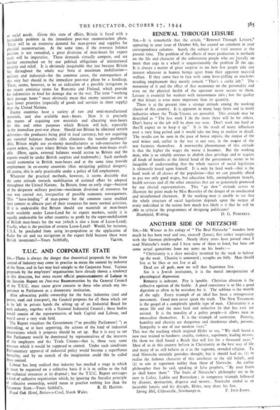T.U.C.' AND CORPORATE STATE
Sts,—There is always the danger that theoretical proposals for the State control of industry may come in practice tn mean the -control by industry of the State, and in fact may. lead straight to the Corporate State. Various proposals by the emp!oyers' organisations have already shown a tendency in this direction, but more recent Official --propounctletents of Labour in the Interim Report-on Post-war Reoanstruction by the General Council of the T.U.C. must cause grave concern to those who attach any im- portance to Parliament as a democratic institution.
After advocating public ownership for the basic industries (coal and power, steel and transport), the Council proposes for all those which are tc be left in private hands the seiting up of an Industrial Board for each industry, together with a National Industrial Council ; these bodies would consist of the representatives of both Capital and Labour, and wou'd cover a very wide field.
The Report visualises the Government (" or possibly Parliament! ") as controlling, or at least appreving, the actions of the kind of industrial corporations which it proposes should be set up. But it is easy to see that Parliament wou!d be dominated by representatives of the interests of the employers and the Trade Unions—that is, those very same interests which it would be supposed to control. Under such conditions Parliamentary approval of industrial policy would become a superfluous formality, and by no stretch of the imagination could this be called State control.
Labour has long realised that industry has reached a stage in which It must be organised on a collective basis if it is to utilise to the full the technical resources at its disposal ; but the T.U.C. Report envisages a kind of collective organisation which, by ignoring the Socialist principle of collective ownership, would mean in practice nothing less than the Corporate State.—Yours faithfury, R. D. HATTON. Royal Oak Hotel, Bettros-y-Coed, North Wales.


























 Previous page
Previous page